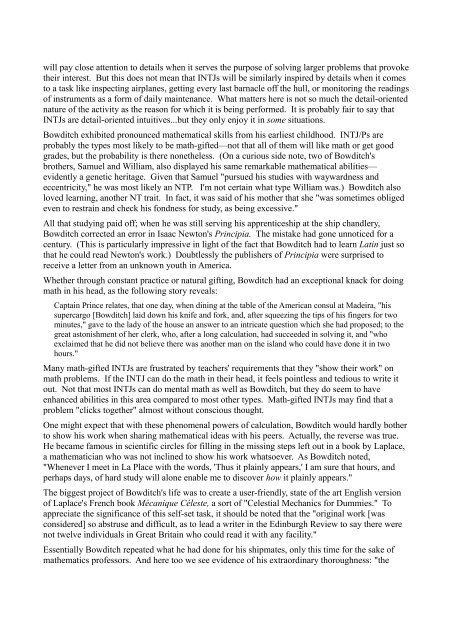Create successful ePaper yourself
Turn your PDF publications into a flip-book with our unique Google optimized e-Paper software.
will pay close attention to details when it serves the purpose of solving larger problems that provoke<br />
their interest. But this does not mean that INTJs will be similarly inspired by details when it comes<br />
to a task like inspecting airplanes, getting every last barnacle off the hull, or monitoring the readings<br />
of instruments as a form of daily maintenance. What matters here is not so much the detail-oriented<br />
nature of the activity as the reason for which it is being performed. It is probably fair to say that<br />
INTJs are detail-oriented intuitives...but they only enjoy it in some situations.<br />
Bowditch exhibited pronounced mathematical skills from his earliest childhood. INTJ/Ps are<br />
probably the types most likely to be math-gifted—not that all of them will like math or get good<br />
grades, but the probability is there nonetheless. (On a curious side note, two of Bowditch's<br />
brothers, Samuel and William, also displayed his same remarkable mathematical abilities—<br />
evidently a genetic heritage. Given that Samuel "pursued his studies with waywardness and<br />
eccentricity," he was most likely an NTP. I'm not certain what type William was.) Bowditch also<br />
loved learning, another NT trait. In fact, it was said of his mother that she "was sometimes obliged<br />
even to restrain and check his fondness for study, as being excessive."<br />
All that studying paid off; when he was still serving his apprenticeship at the ship chandlery,<br />
Bowditch corrected an error in Isaac Newton's Principia. The mistake had gone unnoticed for a<br />
century. (This is particularly impressive in light of the fact that Bowditch had to learn Latin just so<br />
that he could read Newton's work.) Doubtlessly the publishers of Principia were surprised to<br />
receive a letter from an unknown youth in America.<br />
Whether through constant practice or natural gifting, Bowditch had an exceptional knack for doing<br />
math in his head, as the following story reveals:<br />
Captain Prince relates, that one day, when dining at the table of the American consul at Madeira, "his<br />
supercargo [Bowditch] laid down his knife and fork, and, after squeezing the tips of his fingers for two<br />
minutes," gave to the lady of the house an answer to an intricate question which she had proposed; to the<br />
great astonishment of her clerk, who, after a long calculation, had succeeded in solving it, and "who<br />
exclaimed that he did not believe there was another man on the island who could have done it in two<br />
hours."<br />
Many math-gifted INTJs are frustrated by teachers' requirements that they "show their work" on<br />
math problems. If the INTJ can do the math in their head, it feels pointless and tedious to write it<br />
out. Not that most INTJs can do mental math as well as Bowditch, but they do seem to have<br />
enhanced abilities in this area compared to most other types. Math-gifted INTJs may find that a<br />
problem "clicks together" almost without conscious thought.<br />
One might expect that with these phenomenal powers of calculation, Bowditch would hardly bother<br />
to show his work when sharing mathematical ideas with his peers. Actually, the reverse was true.<br />
He became famous in scientific circles for filling in the missing steps left out in a book by Laplace,<br />
a mathematician who was not inclined to show his work whatsoever. As Bowditch noted,<br />
"Whenever I meet in La Place with the words, 'Thus it plainly appears,' I am sure that hours, and<br />
perhaps days, of hard study will alone enable me to discover how it plainly appears."<br />
The biggest project of Bowditch's life was to create a user-friendly, state of the art English version<br />
of Laplace's French book Mécanique Céleste, a sort of "Celestial Mechanics for Dummies." To<br />
appreciate the significance of this self-set task, it should be noted that the "original work [was<br />
considered] so abstruse and difficult, as to lead a writer in the Edinburgh Review to say there were<br />
not twelve individuals in Great Britain who could read it with any facility."<br />
Essentially Bowditch repeated what he had done for his shipmates, only this time for the sake of<br />
mathematics professors. And here too we see evidence of his extraordinary thoroughness: "the




